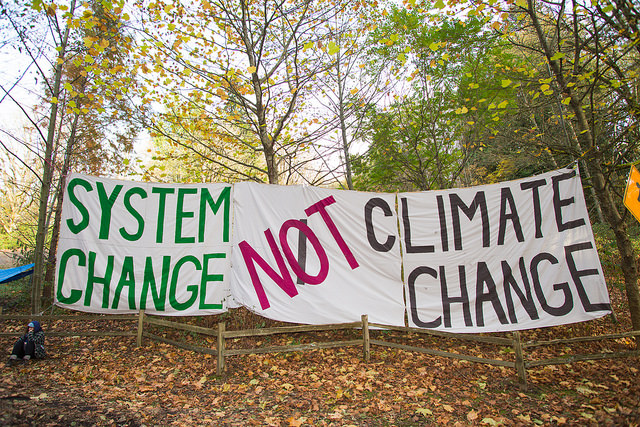Capitalism is causing poor people across the world to suffer the devastating effects of climate change. Locally we have our own peculiar narration to tell. Some of the key issues we are suffering are persistent floods, the drying up of Lake Chad and deforestation.
Climate change has also lent a helping hand to various forms of insurgency and violence including Boko Haram, herder/farmer clashes, militancy over Biafra and in the Niger Delta and wider banditry. These political catastrophes have resulted in killings, maiming and kidnapping of not a few poor people across the country.
Last year, floods again hit around 40% of the states. Houses were devastated, water-borne diseases became rampant and in many cases poor people had to retreat to Internally Displaced People (IDP) camps. This was particularly ironic in areas of the Niger Delta where the suffering masses could see gas being flared from their submerged homes. Gas flaring being one of the greatest causes of climate change across the whole of sub-Saharan Africa.
Climate change over the longer time period, is also likely to lead to rising sea levels. The possibility of some areas of Lagos and the Niger Delta submerging in the sea is great. This will cause devastation, particularly to the poorer communities.
In contrast in the north and especially the north east, it is lack of water and rains that are causing problems. Lake Chad was once the provider of economic life for the people in North East and the neighbouring countries of Chad, Cameroon and Niger. This included fisheries that provided an important source of protein across the country and water for irrigation to support intensive agriculture.
The surface area of Lake Chad, at its peak in the 1960s, was estimated to have been at least 25 thousand square kilometres. This supported an economy for nothing less than 40 million people across the region. Later, climate change drastically reduced the area of water. Its surface area is now put at only 1,350 square kilometres, that is around a twentieth of its original coverage.
This has in no little way affected the practice of agriculture in the area resulting in huge reductions in harvests and a resulting increase in poverty. The rise of Boko Haram was one result of this devastation of the local economy. The popular masses searched for anyway out of their growing poverty, no matter what the likelihood of success.
Cattle herders have been forced to roam further south in search of greener pastures for their animals. Their traditional grazing areas suffered as the Sahara Desert has gradually expanded. Herders then came into conflict with resident farmers. They in turn were also suffering from reduced harvests as a result of reduced rains and smaller farms from population growth – reducing their farms, on average, to a quarter their size in the 1960s. These pressures meant that some farmers took over lands that were traditionally used by migrating cattle herders.
As a result, the two communities have come into increased conflict. Once started, this spiral of violence and retribution has proved to be extremely difficult to resolve and, if anything, has been exacerbated by political interference and indiscriminate action by the security forces.
In the oil producing communities of the Niger Delta, oil pollution of the surrounding water and air became the lot of the poor masses. In addition to suffering the traditional water carried diseases such as diarrhoea, typhoid and cholera, they are now suffering new attacks such as respiratory problems, and skin cancers. As a result, low level militancy, oil bunkering and kidnapping continue as well as other conflicts with the security services and the activities of cultists.
In the south east, the Indigenous Peoples of Biafra (IPOB), although banned by the government, continue their activities. They are now demanding a referendum on independence for Biafra with a threat of a boycott of next year’s elections. There has been violence since August 2015, with the security forces described as being ‘trigger happy’ by Amnesty International. At least 60 people were killed on ‘Biafra Remembrance Day’, 30 May 2016 and the following day in Onitsha. Because of poverty and inequality, many people are turning to nationalist solutions, despite the lack of evidence of progressive activities by the state governments of the south east. Politics, religion and ethic manipulations have further fueled the cultural differences thereby increasing the tempo of these crises.
The issue of deforestation, common to all, is also very important in x-raying the consequences of climate change. Lack of forest cover means that plants that normally convert carbon dioxide to oxygen are lost. The level of carbon dioxide in the atmosphere increases making climate change worse. Forests also provide an important resource for common people who are able to collect wood and fruits and to hunt for bush-meat. Tree cover can also reduce the impact of floods on soil and gully erosion. But Nigeria has lost almost all its natural forest cover with only around five per cent remaining. The recent increases in the cost of kerosene mean that many poor people are turning back to charcoal or wood for their cooking. This is worsening the problem of loss of forest cover.
There is therefore the need for pro-active measures by the various governments. It is also high time the popular masses took collective action over the issue of climate change. We need the crystallizing of a movement in order to save popular humanity from avoidable ruin. The rich are better placed to protect themselves. So it is left to the rest of the poor people to take up the issue of climate change and its many impacts when then are fighting over issues such as the minimum wage and their immediate local needs.
by Biodun OLAMOSU









